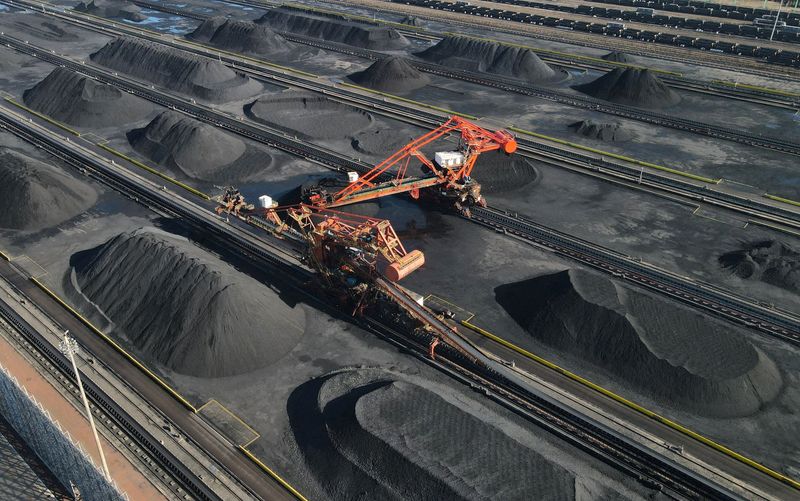
© Reuters. FILE PHOTO: An aerial view of the machinery at the coal terminal of Huanghua port, in Hebei province, China February 1, 2023. China Daily via REUTERS/ File Photo
SINGAPORE (Reuters) – The global coal industry may have to shed nearly 1 million jobs by 2050, even without any further pledges to phase out fossil fuels, with China and India facing the biggest losses, research showed on Tuesday.
Hundreds of labour-intensive mines are expected to close in the coming decades as they reach the end of their lifespans and countries replace coal with cleaner low-carbon energy sources.
But most of the mines likely to shut down “have no planning underway to extend the life of those operations or to manage a transition to a post-coal economy,” U.S.-based think tank Global Energy Monitor (GEM) warned.
Dorothy Mei, project manager for GEM’s Global Coal Mine Tracker, said governments needed to make plans to ensure workers do not suffer from the energy transition.
“Coal mine closures are inevitable, but economic hardship and social strife for workers are not,” she said.
GEM looked at 4,300 active and proposed coal mine projects around the world covering a total workforce of nearly 2.7 million. It found that more than 400,000 workers are employed in mines set to cease operations before 2035.
If plans were implemented to phase down coal to limit global warming to 1.5 degrees Celsius (2.7 degrees Fahrenheit), only 250,000 miners – less than 10% of the current workforce – would be required worldwide, GEM estimated.
China’s coal industry, the world’s biggest, currently employs more than 1.5 million people, GEM estimated. Of the 1 million job global job losses expected by 2050, more than 240,000 will be in the province of Shanxi alone.
China’s coal sector has already undergone several waves of restructuring in recent decades, with many mining districts in the north and northeast struggling to find alternative sources of growth and employment following pit closures.
“The coal industry, on the whole, has a notoriously bad reputation for its treatment of workers,” said Ryan Driskell Tate, GEM’s program director for coal.
“What we need is proactive planning for workers and coal communities … so industry and governments will remain accountable to those workers who have borne the brunt for so long.”
Source: Investing.com





























